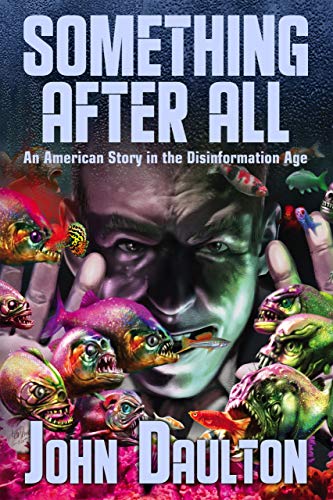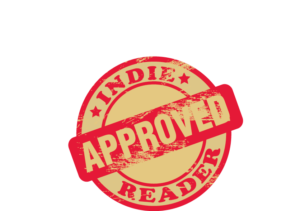Something After All: An American Story in the Disinformation Age received a 4+ star review, making it an IndieReader Approved title.
Following find an interview with author John Daulton.
What is the name of the book and when was it published?
Something After All: An American Story in the Disinformation Age; Published February 2, 2020
What’s the book’s first line?
When my sister went off to college, my old man didn’t hire anyone to take her spot.
What’s the book about? Give us the “pitch”.
Dean Sardelle is the stereotype millennial. He just wants to be online. Working in the family pet shop is beneath him. With his sister Sheila, “the smart one,” off at college, the family needs Dean to help them out. The family’s once thriving chain of pet stores is down to the last location, and if they can’t keep it afloat while Sheila is getting a business degree, then it’s all over, a hundred years of history lost on their watch. Worse, Dean’s mother is sick, and without an income, there will be no way to pay the smothering medical bills. Literally everything is on the line.
Slacker that he may be, Dean realizes he has to step up and try. But his lack of interest all those years growing up has left him with neither business sense nor selling skills. Which makes him all but worthless in the greater scheme of things. He needs help. And like a miracle, Midas Murphy arrives.
Midas Murphy is a man with a silver tongue and a golden touch. He seems to be perfectly adapted to the old world and the new. A master of both. And he promises to help Dean save his family. It’s hard to tell what he is doing, though. Whether it’s legal or not. Whether it’s real or not. It might even be magical. And if it is magic, is it good or evil?
Only by navigating a maze of love and hate, truth and deception, aliens, a sex cult, and a murder can Dean hope to work all that out.
What inspired you to write the book? A particular person? An event?
My first book became a best seller in part because of how easy it was for indie writers to capitalize on personal data through social media advertising. Especially in the early days, when it was available to “regular” folks like me—assuming they happened to be marketing savvy and tech savvy enough to use it. I was, so I jumped on it.
The deeper I got into it, however, the more I began to think, “Just because this is legal doesn’t mean it’s a good idea.” What was possible to do was beyond regular marketing and advertising. The power all that data and technology brought to my fingertips was borderline magical.
My novel Something After All was born from that experience. It took me almost ten years to figure out how to explain it in a way that is not mired in the technical details of any particular social media platform or encumbered by a bunch of marketing speak. And I needed to make it timeless, in the end, because the principles in play are not exclusively technological. They are simply amplified by technology. So I had to figure out how to bring all of it back around to what Aristotle tried to teach us in Rhetoric and what John Gardner wrote about regarding moral fiction. It’s about language and meaning and intent in a world full of humans; about what is good, and what is not. To the best of my ability, that is what I have attempted to do.
What’s the main reason someone should really read this book?
With an insider’s view, I hope I have shown how the forces of our time and technology function in a real way, in all the real ways. I think lots of folks feel helpless in the face of modern media and the various internet platforms, protocols, and apps. They understand their data is used, and they have inklings how, here and there, but they mostly don’t. And a thing misunderstood is often a thing feared. I’ve tried to shine a light on the beast, so that they might know it for what it is. My hope is that I have done so in a pleasant and digestible way.
What’s the most distinctive thing about the main character? Who-real or fictional-would you say the character reminds you of?
Dean Sardelle is real. You all know him. He might be you. He might be your kid. He is my kid. I have this son, in my home. In a way, I am only barely not him myself. It’s very real to me. This is our now. Someone has to look it in the face. I tried. I hope it helps.
When did you first decide to become an author?
In fifth grade. The teacher asked us to write a 1- or 2-paged story. Mine was 13 pages. Before that assignment, it had never really registered to me that the books I loved to read (and those that my parents had read to me growing up) were written by actual people. I mean, I knew they were, because my mom always read the author’s name at the start of every story, but it wasn’t until that assignment that it dawned on me that those writers were people in the same sort of way that I was “people” too.
Is this the first book you’ve written?
No. This is my 9th novel: 7 of which have been published, another is garbage, and one is in its third round of editing.
What do you do for work when you’re not writing?
I’m a marketing consultant and solutions engineer for a big software company; I have a ranch where I pasture horses and mules; and I do freelance writing and editing from time to time as well.
How much time do you generally spend on your writing?
Sometimes it’s all raw discipline and I have to force myself to do it. I schedule half-hour minimums, five days a week under penalty of extreme guilt and self-loathing. Other times it’s a compulsion I couldn’t stop if I wanted to. I’ll write for hours and hours, or for days, or even weeks on end sometimes. In between those two extremes, there are occasional and necessary hiatuses devoted to drunkenness, video games, and excuse making.
What’s the best and the hardest part of being an indie?
The absolute freedom is the best part. I write what I want to write. Say what needs to be said. The hardest part is having to face the consequences of your liberty. You have no backing. No support. No financing. It’s agonizingly difficult to get anyone to read what you write, and with the rise of the indie platforms and the reality that everyone and their dog has a word processor, there is a TON of competition.
What’s a great piece of advice that you can share with fellow indie authors?
Write. Stop talking about being a writer. Stop dreaming about it. Stop romanticizing it. It’s not romantic. Just write. Every day. Get to “The End.” Then go back and look at what you did. There will be good stuff in there. And garbage. You will need many drafts. Lots of deleted chapters and pages. It’s fine. Writing is a process, not a miracle of the muses—plus, the muses can only find you by the tick-ticking of your keyboard or scratch-scratching of your pen.
Would you go traditional if a publisher came calling? If so, why?
Sure. Publishing is a brutal business. If someone wanted to help, I’m totally into it if the contract is agreeable.
Is there something in particular that motivates you (fame? fortune?)
Not really. I was writing long before my first book took off. For myself. For free. I will continue to write even if nobody buys my stuff anymore.
Which writer, living or dead, do you most admire?
Nathaniel Hawthorne.
Which book do you wish you could have written?
The House of the Seven Gables and all of Nathaniel Hawthorne’s short stories … he was Twilight Zone before there was one. Schools make everyone read The Scarlet Letter to teach the dangers of oppressive religion and patriarchal power—which are important things to learn—but in doing so they spoil Hawthorne’s legacy for young readers. I wish they’d let kids read Rappaccini’s Daughter or The Minister’s Black Veil first. Reading needs to be FUN, then educational.

